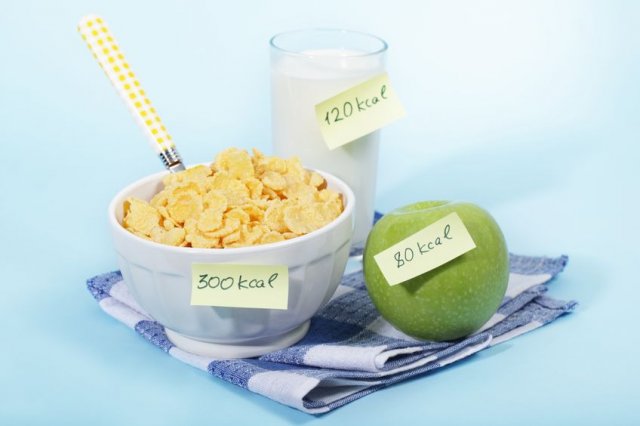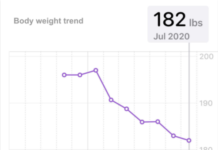Are you making healthy dietary changes and upping your exercise, but you seem to be stuck in a weight loss rut? If this sounds familiar, you are likely facing weight loss resistance, which means that your body is holding on to excess weight. While the “calories in, calories out” motto can get you started towards managing your intake, there are a lot of nuances to nutrition that could be making your diet harder to follow than it needs to be. Let’s take a closer look at 4 common (and detrimental) weight loss mistakes, and then dig into whether or not you should be counting calories.

1. Not getting enough fat
Contrary to popular belief, not incorporating enough fat into your diet might be the number one mistake sabotaging your weight loss efforts. In fact, weight loss resistance is just one of many consequences of a long term, low fat diet model. Not only does the body need sufficient fat to meet nutritional needs, but fat also keeps us satiated (feeling full), so we are far less likely to overeat and crave refined carbs.
Processed fats such as trans-fats (hydrogenated and partially hydrogenated oils) will contribute to obesity and a host of other problems. On the flip side, good sources of fat are actually important for weight loss(1). These include olive and flax oils, coconut oil, grass fed or organic butter, ghee, nuts and seeds, and naturally occurring fats in high quality meats. Particularly if you find yourself fighting cravings or that common mid-afternoon energy crash, consider upping the fat content of your diet.
If weight loss is the goal, moderating them to one serving per meal is recommended (approximately one tablespoon, which equals 120 calories). This is where counting calories can come in handy.
2. Not sleeping enough
Without adequate sleep, losing weight becomes next to impossible. Lack of sleep affects our sugar metabolism and hormonal balance and often leads to excessive hunger and cravings the following day. The body physiologically interprets lack of sleep as a stressor, and reacts accordingly with an increase in cortisol, our primary stress hormone. Cortisol alone can lead to weight gain, particularly around the mid-section. Hormonal balance is key to weight loss, and getting enough sleep should be a main priority.
If you suffer from insomnia, have a baby or struggle with any other factors that make getting good sleep out of your control, counting calories can help you keep your cravings and dietary goals in check.
3. Eating too many carbs
While carbohydrates should not be thought of as the enemy when trying to lose weight, studies(2) show that eating too many refined carbs is a culprit in weight gain, which is why counting calories plays an important role in managing your intake. Carbohydrates are the fastest burning macronutrient (followed by protein, then fat), and work to spike our blood sugar at a faster rate. This then leads to a blood sugar dip, often leaving us hungry and craving more, and in the long run can actually damage our metabolism.
Opt for healthy carbohydrates such as starchy vegetables (winter squash, sweet potato, etc.) and whole grains in moderation. Ideally, the vast majority of your carbohydrate intake will be from fresh vegetables and fruits, and processed carbs such as pasta, spaghetti, baked goods, and bread will be largely omitted.
Counting calories can be extremely helpful, especially in the beginning stages of adopting a lower carbohydrate diet model. There is no magic number necessarily when considering how many grams of carbs to eat per day (as every individual has different nutritional needs), but tracking them can make a huge difference in knowing if and when you’re going overboard.
4. Believing that cravings are controlled by will-power alone
One of the most essential parts to successful weight loss is blood sugar regulation. When our blood sugar drops, we become ravenously hungry and are much less likely to discern between healthy and non-healthy foods, let alone make healthy choices. If we eat at regular intervals throughout the day, and include healthy proteins, fats and plenty of fruits and vegetables in each of these meals/snacks, our bodies are able to better sustain energy levels, and avoid reaching the point of feeling famished.
The most accurate and easiest way to do this is by counting calories, as this will allow you to monitor your intake of all major food groups, ensuring that you are eating to control cravings.
So, should you be counting calories?
The popular and widely accepted theory of calorie intake is called thermodynamics, which is the study of the relationship between heat, work, and the internal energy of a system. What this boils down to for weight loss is that you have to burn more calories than you take in (this is basic science, and why counting calories works). However, it is essential to understand that not every calorie is created equal.
Keep in mind that there are differences in everyone’s digestion and metabolism that make it difficult to know exactly how many calories you are actually getting from food. Despite its complexities, calorie counting is absolutely one of the best tools we have to estimate intake.
You can’t eat more calories than you burn and expect to lose weight. However, eating certain foods will increase your metabolic rate and level of satiety, therefore promoting further weight loss. Meal planning and tracking your diet through both calorie counting and making sure the bulk of those calories come from nutrient dense, whole foods, can help you stick to a solid plan. In fact, a study about keeping a food diary published in the American Journal of Preventive Medicine showed that people, who tracked what they eat six days a week, lost twice as much weight than people, who kept food records one day a week or less(3).
References
1. Quantitative effects on cardiovascular risk factors and coronary heart disease risk of re-placing partially hydrogenated vegetable oils with other fats and oils.
http://www.nature.com/ejcn/journal/v63/n2s/full/1602976a.html
2. Simple carbohydrates and obesity: Fact, Fiction and Future.
http://www.nature.com/ijo/journal/v30/n3s/full/0803522a.html
3: Hollis, J. American Journal of Preventive Medicine, August 2008; vol 35.
http://www.ajpmonline.org/article/S0749-3797(08)00374-7/fulltext



